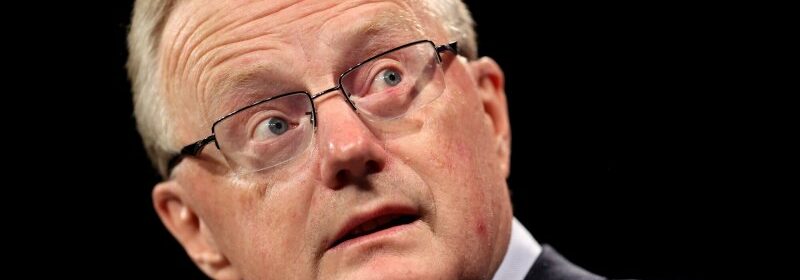The economic narrow path is getting bumpy, says Lowe

Save articles for later
Add articles to your saved list and come back to them any time.
The Reserve Bank has signalled unemployment may have to rise to bring inflation under control, with bank governor Philip Lowe warning the economy’s “narrow path” to success was likely to be bumpy.
Lowe, in a speech in Sydney on Wednesday, said even though inflation had peaked, it would likely require a “couple of years” of relatively slow growth to bring it back to within the RBA’s 2-3 per cent target band.
Reserve Bank governor Philip Lowe signals there will be a trade-off between bringing down inflation and the nation’s unemployment rate.Credit: Bloomberg
On Tuesday, the RBA took the official cash rate to an 11-year high of 4.1 per cent. It did not rule out further interest rate rises.
The bank is in the middle of the most aggressive tightening of monetary policy since the late 1980s with growing concerns its efforts to bring inflation to heel will lead to a recession. National accounts figures on Wednesday are expected to confirm a slowdown in economic activity through the first three months of the year.
Lowe told the Morgan Stanley Australia conference that Tuesday’s move was to ensure inflation came down in a timely manner.
He said one of the “unsung” achievements of the bank’s ultra-low interest rates, and government stimulus, throughout the COVID pandemic was the sharp fall in unemployment that has recently inched up to 3.7 per cent.
Lowe signalled that while low unemployment was a major success, the bank was heavily focused on bringing inflation down to its target range.
“I want to make it clear, though, that the desire to preserve the gains in the labour market does not mean that the board will tolerate higher inflation persisting,” he said.
“There is a limit to how long inflation can stay above the target band. The longer it stays there,
the greater the risk that inflation expectations adjust and the harder, and more costly, it will be to get inflation back to target.
“If inflation stays high, this will damage the economy and all Australians will feel the effects.”
Lowe said there were signs higher interest rates were starting to affect the economy.
He said internal data from commercial banks was showing spending was most subdued among households with a mortgage, especially those who had borrowed large amounts relative to their income.
Households that rent were also cutting their spending.
Lowe said the bank was also watching the number of people starting to fall behind on their mortgages.
“These remain very low, although they have increased a little of late. Banks report that their customers are managing to make their mortgage payments, although many have had to cut back on other spending. So, it is a complicated picture,” he said.
Food and grocery inflation is running faster than general inflation.
Lowe said the decision to lift rates on Tuesday was driven in part by concerns that inflation pressures for services was not falling as fast as for goods.
He said services price inflation both in Australia and overseas remained persistent. The risk of that enduring meant the RBA believed it needed to lift the official cash rate.
Bringing inflation down was vital to the nation’s long-term economic interests.
“If inflation stays high for too long, it will become ingrained in people’s expectations and high inflation will then be self-perpetuating,” he said.
“As the historical experiences shows, the inevitable result of this would be even higher interest rates and, at some point, a larger increase in unemployment to get rid of the ingrained inflation. The board’s priority is to do what it can to avoid this.
“It is a narrow path and likely to be a bumpy one, with risks on both sides.”
Cut through the noise of federal politics with news, views and expert analysis from Jacqueline Maley. Subscribers can sign up to our weekly Inside Politics newsletter here.
Most Viewed in Politics
From our partners
Source: Read Full Article

